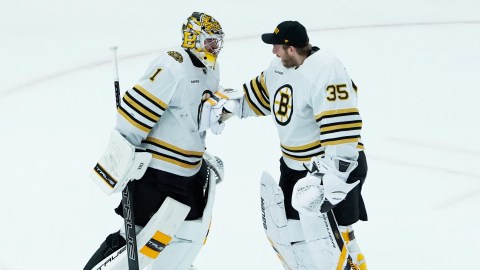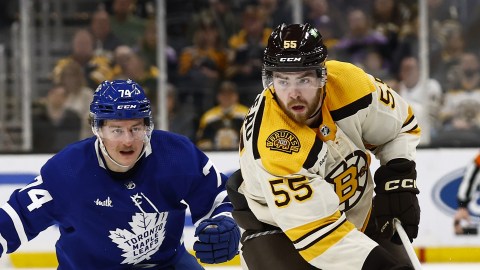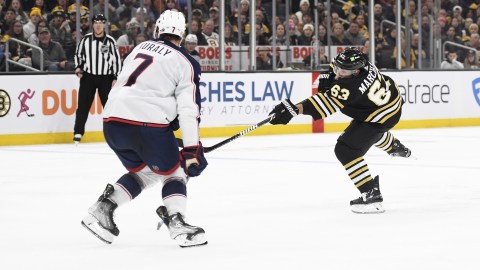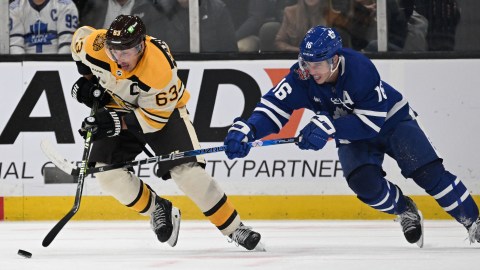Any father dreams of seeing his son follow in his footsteps and enter the family business. Maybe that’s owning a company together or working in the same medical practice. For Paul and Lane MacDermid, things weren’t quite that simple.
Lane enters his second professional season in the Boston Bruins organization after spending his rookie year in Providence. Paul, still very much involved in the game as part-owner of the Ontario Hockey League’s (OHL) Owen Sound Attack for the last decade, is a former 14-year NHL veteran.
After parts of three junior seasons with the OHL’s Windsor Spitfires in the early 1980s and portions of two AHL seasons in Binghamton, Paul made his home in the NHL as a nine-year member of the old Hartford Whalers, before wrapping up his career with stops in Winnipeg, Washington and Quebec. In August of 1989, a 26-year-old Paul entered his final year in Connecticut by welcoming a new member to what was then just a two-person family.
Baby Lane.
For the next six years, Lane grew up around the locker room. He would play soccer with the likes of Owen Nolan, Mike Ricci and Joe Sakic, and get teased on occasion by the group as well. He’d even spend nights going to Nolan’s apartment to visit his big aquarium and feed the fish. There was nothing better than spending time around the game to which his father had dedicated his life.
Due to an intolerable back injury in 1993, Paul spent his final season as a player in the lockout-shortened 1994-95 campaign, wrapping up a career that amassed 121 goals, 152 assists, 273 points and 1,419 penalty minutes in 733 games between the regular season and postseason.
Lane was just old enough to recognize that his father got to play a game for a living, yet far too young to think about his own eventual path. But as the years went on, it became quite clear that hockey was his passion as well.
In 2006, at a youthful 17 years of age, Lane joined his father’s junior club in Owen Sound. As a first-year player, the left wing scored two goals and added five assists in 57 regular-season games, along with 115 penalty minutes, including 13 fighting majors. After a little while, those 13 encounters seemed less like an aberration and more like an expectation. Year Two brought 18 more fights, 190 more penalty minutes and a more well-rounded 13 goals and 24 points in a personal-high 66 games.
But a funny thing happened in December of Year Three.
Lane was traded. By his father.
“It was tough, but as an organization, we were rebuilding,” recalled Paul. “We didn’t have a lot of draft picks, so we felt it might be best for our organization to see what we could get for Lane if we tried to move him. It got into a bit of a bidding war with Windsor and London. But I met my wife in Windsor, her family is all still down there, and London is quite a rivalry, especially when I played in Windsor.”
So Windsor it was. Lane went from spending two-plus years with the team his father, uncle Peter and three others owned in Owen Sound to traveling about five hours southwest to the Spitfires, where Paul began his own career. After many discussions with his parents, Lane was disappointed to leave home in Sauble Beach,Ontario, but eager for the opportunity to go to a largely successful team that many felt would make a lot of noise in the playoffs.
Lane had no idea that the trade may have been the best thing that could have possibly happened to his career.
At the time, Owen Sound was floundering near the bottom of the Midwest Division, while Windsor was running away with the West. After 14 points and 85 PIM in 26 games for the Attack, Lane collected another staggering 112 PIM, 21 points and a plus-23 rating in only 38 games for the Spitfires to close out the regular season, but Lane and the Spitfires were just getting started. Led by Taylor Hall, Windsor captured the Memorial Cup championship over the Western Hockey League’s Kelowna Rockets. Lane was instrumental to his team’s 20-game playoff run, totaling nine points and another 38 PIM. By season’s end, Lane’s 2008-09 resume featured 84 games, 19 goals, 25 assists, 44 points, 235 penalty minutes and 21 fights.
In three junior seasons, Lane collected 542 penalty minutes and got into 52 scraps. He’d found his niche. And, on June 27, 2009, Lane was selected by Boston 112th overall in round four of the 2009 NHL entry draft.
“It was really exciting for us,” Paul said. “There was talk that he may get drafted, and of course, being an owner in the OHL, you get talking to scouts, and they were asking me a lot of questions about him. I actually didn’t talk to anybody from Boston, but it certainly sounded like he was going to get drafted. But until you hear his name being called, you never really know.”
Lane was thrilled. He said he felt “iffy” going into the draft as to whether he would be selected at all. Instead, he was taken right in the middle. Then began the whirlwind. Would he turn pro or be forced into another year of over-age junior hockey with Windsor? He felt ready to make the next step.
Just weeks after the draft in July 2009 came Boston’s third annual development camp, and the 6-foot-3, 205-pound Lane was on the 25-man roster, along with several other Providence Bruins past and future. Lane was looking to make an impression. He knew he had a chance to make the P-Bruins if he just played his game — physical, aggressive on the body, an active forecheck and a willingness to drop the gloves.
Lane put on a solid showing at development camp, and two months later, it was time for the big club’s training camp. After eight days with the Spoked B, many players were returned to their respective junior clubs. The 20-year-old Lane was awarded the Spoked P.
The professional game was quite an adjustment for Lane. It took him 36 games to register his first pro point, a goal in a 3-1 win over the Adirondack Phantoms. To no surprise, however, he dusted off his dukes for his first pro fight in only his fourth game, an eight-second decision over Lowell’s Louis Robitaille. The fight may have been quick, but the experience wasn’t short-lived. Lane went on to spend the entire season in Providence, finishing tied for first among AHL rookies with 21 bouts while leading all Providence Bruins with 155 penalty minutes in his 65 games. He also contributed two goals and three assists, sandwiched around a late-season broken thumb that forced him to miss three weeks, which stemmed, naturally, from a fight.
Now, with one season in the books, Lane is focused on what lies ahead. But he recognizes he wouldn’t be where he is without his dad.
“He was pretty much in the same boat when he started out, so he’s been there, done that,” Lane said. “Whenever maybe I was having a tough weekend or couple of weeks, things weren’t going my way, I’d always give him a call and see what he had to say about it, and he’d give me a couple pointers on how to correct what was going on. He’s been my role model.”
Paul enjoys watching his son’s journey.
“It brings back a lot of memories of when I was going through the process of getting drafted and going to training camps and trying out for the pro teams when you’re used to playing against junior-age kids and now you’re playing against men that are taking things very serious,” Paul reflected. “That was one of the things I tried to talk to Lane about before he went to training camp, that these guys take things very serious. It’s their job, it’s their livelihood, and they’ve got kids to feed and all that kind of stuff.
“It’s something that’s quite a big step when you’re a 20-year-old trying out for a pro team,” Paul continued. “He was ready for that I think after watching him go through the playoffs and the Memorial Cup with Windsor. His style of game, he needed to take that to the next level as far as the physical aspect of the game. As far as junior goes, he’s certainly very strong physically in the OHL, but he needed to test himself at the next level.”
With the ability to view games on the Internet through AHL Live, access that certainly wasn’t available when Paul was playing, he and his wife Pam regularly watched Providence in action during Lane’s rookie year, a handful of times in person, but primarily from afar. It wasn’t uncommon for the family to talk on the phone after games, but typically, Monday or Tuesday nights were reserved for wrapping up the weekends.
“If there’s one specific shift I have a question about, what was he thinking or what was going through his mind in a particular situation, sometimes he remembers the play and then kind of explains what he was doing,” Paul said. “He asks me sometimes what he should do in certain situations, but what I try to do is tell him to talk to his coaches because I’m not there every day to hear what the coaches are saying.”
To any outsider looking in, Lane handles himself well in all situations. Sure, coaches had advice and criticism for him throughout the season, but one of the things Providence coach Rob Murray applauds Lane for most is his work ethic. It’s second to none, and Lane attributes that to his father.
“He really taught me the amount of work you have to put in on the ice and off the ice, working on your game and trying to learn the game, all those little things to try to make you a better player,” Lane said. “He really showed me how to do those things and do them at a consistent basis, so it’s not just ‘once in a while I’ll do this,’ but then kind of get away from it rather than making it a part of your daily routine.”
Paul is proud of Lane’s hard-working reputation.
“I guess when kids hear parents sitting around the dinner table talking all the time, they pick up on stuff,” Paul said. “I certainly wasn’t the most skilled hockey player, but I worked hard, and coaches are the ones opening and closing the doors, whether you get out on the ice or not. If you work hard, it’s hard for the coach not to like you. Everybody’s going to make mistakes, but if you’re lazy and making mistakes, the coach isn’t going to open the door.
“That’s what I try to tell the kids. Wayne Gretzky made a mistake every game, but it’s what you do after you make a mistake that the coach really wants to see. I think some of that has rubbed off on Lane, and I certainly never had to tell Lane to work hard during a game.”
Being a professional athlete is unquestionably hard work. If you do what Lane does, it can be even harder. If you’re Paul, it’s hard to watch.
“Going back a few years in juniors when he first started fighting, it didn’t impress us too much because we spent a lot of money on braces,” Paul cracked. “I said at the time, ‘That’s just a waste of money. He’s probably gonna get them knocked out playing hockey.’ Knock on wood, it hasn’t happened yet, and hopefully, it doesn’t. We’ve kind of gotten used to it over time.
“When you first see your kid get into a fight, you’re just hoping he doesn’t get hurt too bad, and then you get more confident that he can handle himself,” Paul continued. “But certainly, stepping up into the American League and then all of a sudden getting into fights … I think it was the first game we saw him play, halfway through the first period, he got into a fight. It’s very nerve-racking. Especially when you get up there, these guys that he’s fighting have a lot more experience at it, and it is a skill that you have to pay attention to what you’re doing or you’re going to get hurt. There’s only one way to learn — you have to get in them, I guess, so I think he’s handled himself pretty well so far.”
Lane’s next goal is to expand his game to a more well-rounded skill set with better stick-handling and an enhanced skating ability, because he knows guys are faster, bigger and stronger in the NHL. His father told him so. But in Paul’s eyes, with more work on his skating and the physical prowess he already displays, Lane just may project to be a bottom-six forward at the next level.
The important thing, though, as is the case with all three MacDermid children, is that Lane does what makes him happy first, whether or not that’s a lifetime of hockey.
“It is quite a thing to see your son following in your footsteps, but it’s his passion. It’s not my passion,” Paul stated. “As parents, we want all our kids — it doesn’t matter whether they’re doing schoolwork or sports — just to do the very best they can and enjoy themselves. If they didn’t want to do it, they wouldn’t do it. To get to the NHL is an awful lot of work, and being drafted is just one small step. There’s a long way to go yet, and I know just being around Lane his whole life that he has the passion, he’s got the fire, and it’s going to burn in him until he gets there, I think.”
If Lane gets there with Boston, there’s only one part Paul may have trouble with — cheering for the Bruins.
“It took a while to ease into it, even after Lane was drafted,” Paul laughed. “But now I can say that I cheer for Boston after all the years in Hartford of hating the Boston Bruins.”
Nothing about Paul and Lane MacDermid’s journey together has ever been simple.



